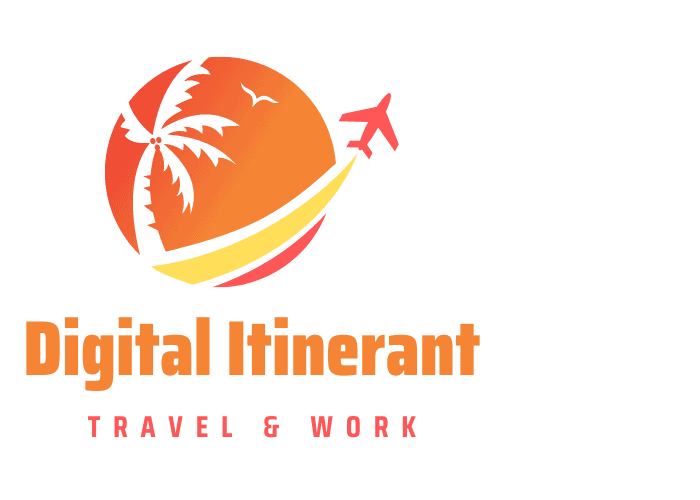Sri Lanka is known for its beautiful nature, its wild animals, friendly people, unique and yummy food, tea fields up in the mountains, trains, and its mixed culture.
And I can testify that you will find all that in Sri Lanka if you decide to stay long enough in the country.
But is Sri Lanka that great for digital nomads? How easy is it to get into the country? How to get a decent internet speed? Where should you be staying?
Well, let me share with you my experience as a digital nomad in Sri Lanka.
Sri Lanka for Digital Nomads at a Glance
The Good:
- Incredible wildlife
- Beautiful beaches
- Amazing mountains
- Cost of living
- Some of the best food I ever had to taste
The Bad:
- Those who need fiber internet speed might have troubles.
- I tried to be 100% transparent and to share any bad experience but I can’t think of any other bad aspect.
How is internet in Sri Lanka?
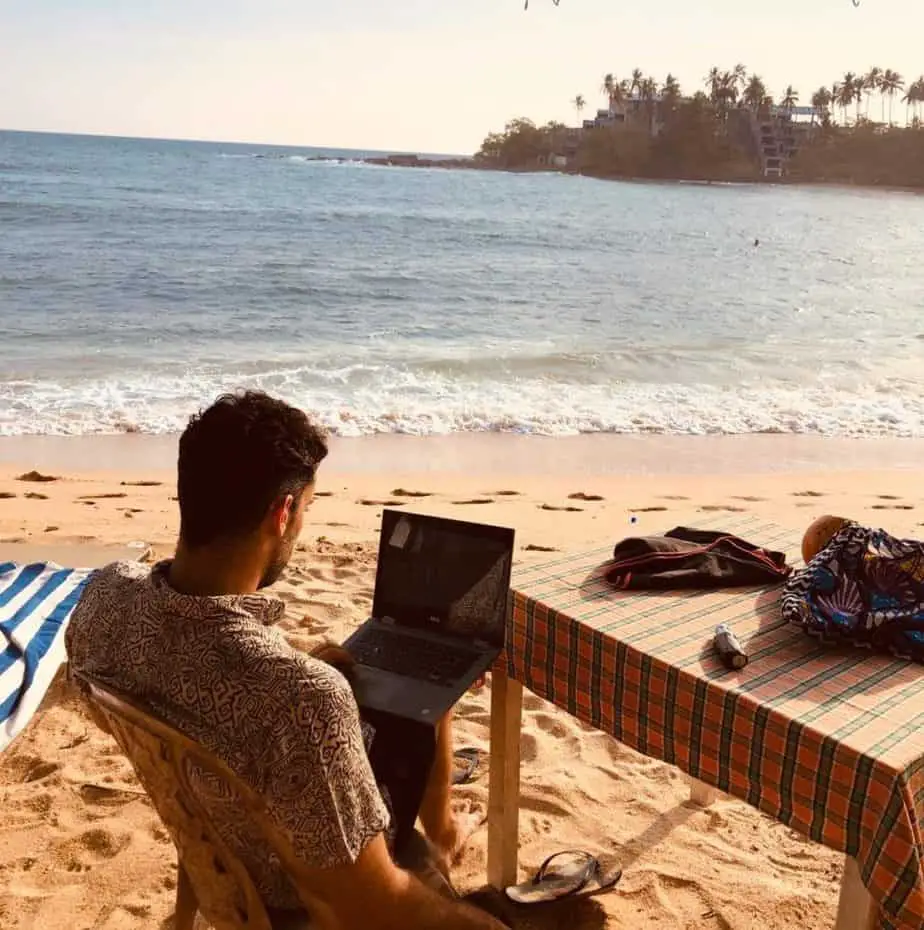
I stayed one month in Sri Lanka, and I have worked from many different spots. I was able to do video calls without any troubles. I never really had any issues with the internet speed.
The only times where I had trouble were when there were power outages. However, when there were power outages, the 4g network was still working fine, and I was able to switch quickly to my mobile broadband.
As the picture above shows, I even have been able to work from the beach in Sri Lanka. This photo has been captured in Tangalle. With my girlfriend, we were staying at Nuga Eden Hotel, one of the best hotels I ever stayed in, and we just had to cross the road to get to the beach to either have a cold drink or to get a few things done to complete the day of work.
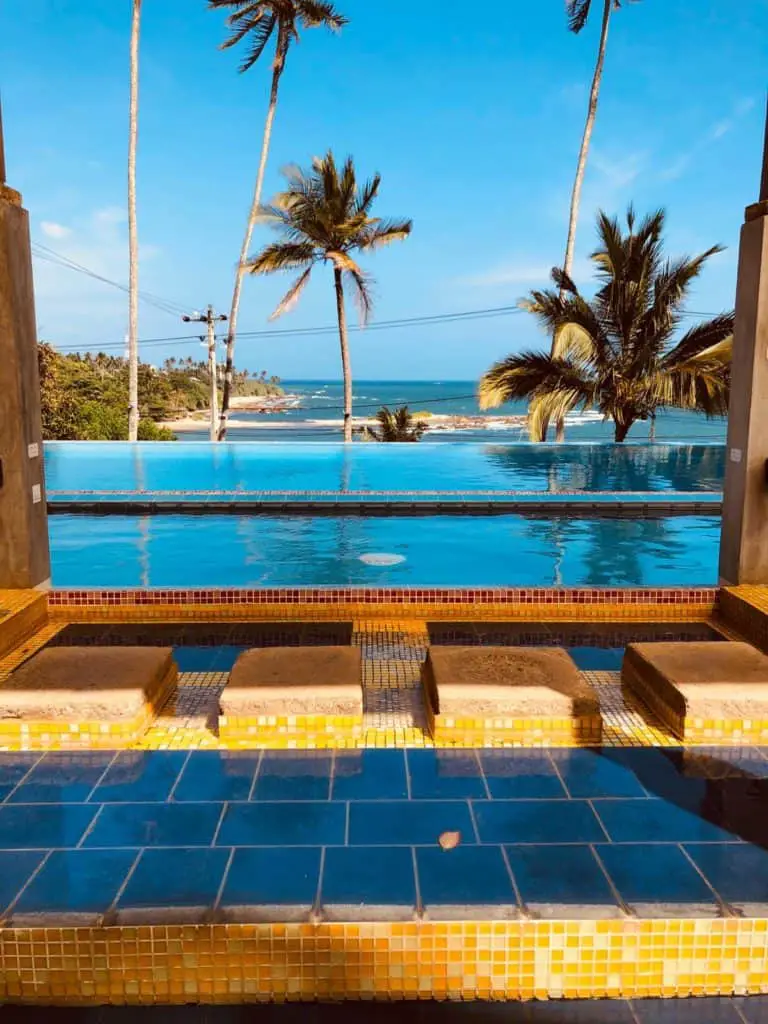
I also had the chance to work from the beach in Dikwella. There is a coworking and coliving hotel there called The Verse Collective.
It is located just in front of the sea, on a very calm and beautiful beach. Lots of digital nomads come and stay there to surf in the morning and then work during the rest of the day.
There are many other great spots to work from in Sri Lanka. If you need to be reassured about the Wifi speed or the 4G Coverage across the country, keep reading below.
WiFi in Sri Lanka
When connecting to fixed broadbands, the type of download speed you could expect should be around 31.42Mbps, while the upload speed should be about 10.01Mbps. Pretty good right?
However, if you decide to work from hotels (and especially cheap ones), you might have to experience slower networks.
Hopefully, as I will show to you in the next section, the 4G coverage should be good enough in most places to back you up.
4G and Mobile in Sri Lanka
For the best 4G coverage, you will need to pick a SIM from the best providers. Two providers are much better than all the other ones. Mobitel and Dialog.
And if you have to pick only one (if you don’t have a dual sim mobile), you should be using Mobitel. Their coverage seems to be the best, based on what I experienced.
If like me, you travel with your partner, I recommend you to buy a SIM from Dialog and Mobitel. This way you will be able to switch to the best network based on your location.
Before booking any new accommodation in a new city or a new spot (by the beach for example), I highly recommend using Nperf.com data coverage map.
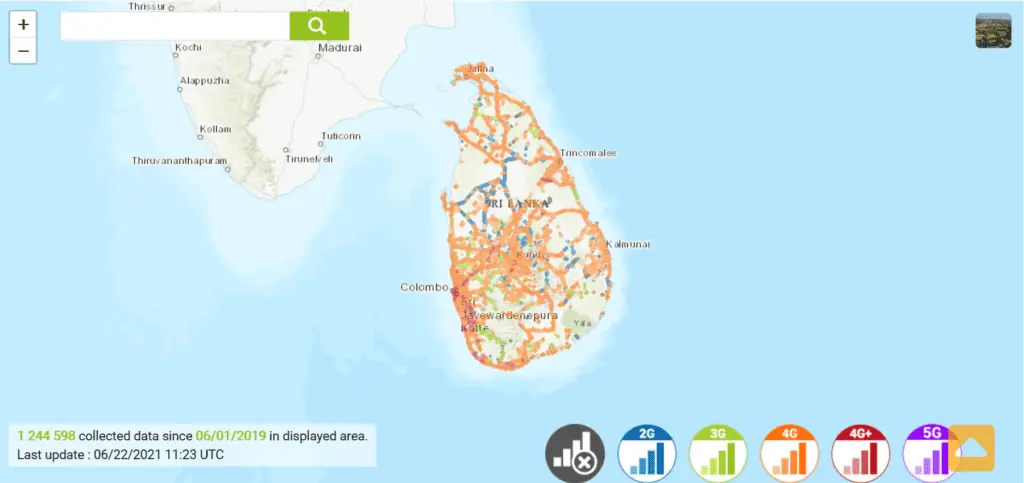
The map above shows how good the coverage is with Mobitel. In most of the places you will eventually visit, you’ll see that it is covered with standard 4G.
This means that you will get a download and upload speed of about 10Mbps.
Where you see red points, you will get a 4G+ coverage. This means that the speed and the stability of the network will both be much better.
Costs of data in Sri Lanka
The type of prepaid plans you can get in Sri Lanka is somehow unique, a bit complex, but very cheap!
For less than $2, you will be able to get nearly 6GB of data.
However, about half of your data allowance will be available during night hours only, the other half will be spent during the day.
On top of that, you will get about 1.5GB of bonus. You can find all the details here.
Sri Lanka E-Sims
The major data providers do not seem to offer any e-sim options at the moment. It will soon be released though.
And there is an option available with one provider. I haven’t tested it, but you can check it out here.
Visas and Documentation for Sri Lanka
During the last couple of years, Sri Lanka has made some notable strides in attracting tourists, which you, as a digital nomad can take advantage of.
Firstly, you can enter Sri Lanka and stay there as a tourist for 30 days.
However, you can also extend it twice, for periods of up to 90 days. The caveat is that you can only do this from Colombo.
Also, you’ll need to fill out an online Travel Authorization application before your arrival. You can do this from your home, while planning the trip, and even from the Sri Lankan airport upon arrival.
Pro-tip: In some cases, it may be cheaper to renew your visa locally, rather than going to a Sri Lankan embassy. So, ask around about prices before renewing your visa.
The Resident Guest Scheme (The Unofficial Digital Nomad Visa)
Sri Lanka does not offer any digital nomad visa. However, the country offers several options that might fit some digital nomads’ needs.
The Resident Guest Scheme (RGS) visa program is open to all foreigners who wish to contribute to the Sri Lankan economy as an investor or worker.
This visa is valid for five years. You have to apply for it beforehand.
Keep in mind that you can’t convert a travel visa to an RGS visa.
Under the RGS, there are two main categories you can apply for as a digital nomad — investor and professional.
Investor Category
If you plan on investing in real estate or other types of business venture, you can apply under the RGS investor category.
However, you will have to invest a minimum of $250,000. As this isn’t realistic for a lot of digital nomads, a professional visa may be your best bet.
Professional Category
Professional category RSG visa is the best option for digital nomads who plan on working remotely from Sri Lanka for up to five years.
The main requirement is that you will have to make monthly deposits of 2,000 dollars into a Sri Lankan bank account. An additional 1,000 dollars will be needed if you wish to come with a dependant (children, spouse, parents).
To apply, you won’t need any travel agent’s help, as it is pretty simple to go through the process from the official website. Here is the list of documents you will need to submit:
- Application filed document
- Letter explaining your request
- Passport copies
- Six pictures
- Marriage certificate copy
- Proof of educational professional and work experience locally and internationally
- Project Proposal
- Medical Report
- Police Clearance Report
- Commendation letters if you have any
- Any Awards you may have acquired
- Bank Account in Sri Lanka (Confirm documentary evidence)
- Applicant – US$ 2,000/=
- Dependent – US$ 1,000/=
The Fees for this Visa should be about USD 50, not more.
Where to Work as a Digital Nomad in Sri Lanka

Thanks to Sri Lanka’s gorgeous views and sandy beaches, there are plenty of spaces that allow you to work in a comfortable environment.
Whether you want to sit by the beach and sip cocktails or enjoy a cup of coffee with the view of the Grand Indian garden — there’s something for everyone!
So, let’s take a look at the best spaces to work as a digital nomad in Sri Lanka.
Co-working spaces
Because Sri Lanka is just at the cusp of transitioning to a DN-friendly country, co-working spaces are somewhat of a novelty. While they’re somewhat common in places such as Colombo or Nugegoda, but you may have issues finding them elsewhere.
That being said, these co-working spaces often come equipped with better internet speeds than anywhere else, so they’re the best option for those who need a fast and steady connection.
Hotels
Sri Lanka is packed full of hotels with lounges that allow you to work from your laptop while enjoying a great atmosphere, and affordable beverages. The Verse Collective in Dikwella is a prime example of this.
The hotel and bar boast high-speed WiFi while providing you with free parking, as well as both an indoor and outdoor working space.
There are also tons of fun activities you can enjoy while on-site, such as fishing, surfing, yoga — and even skateboarding!
Cafés
There are way too many cafes with amazing scenery and great inexpensive food and drinks to list.
Moreover, whatever city you’re staying in, great or small, you’ll likely find a cafe that allows you to work in a calm, natural environment. Some of our favorite spots to do just that are the Grand Hotel Coffee Shop or the Black Cat Café.
Both are famous for their wonderful views and pristine nature. The only difference is that the Black Cat Café is located at the beach, while the Grand Hotel sits across the Grand Indian garden.
So, depending on what you’re in the mood for, or where you’re located, we definitely recommend checking either of them out.
Tech Guide for Digital Nomads in Sri Lanka
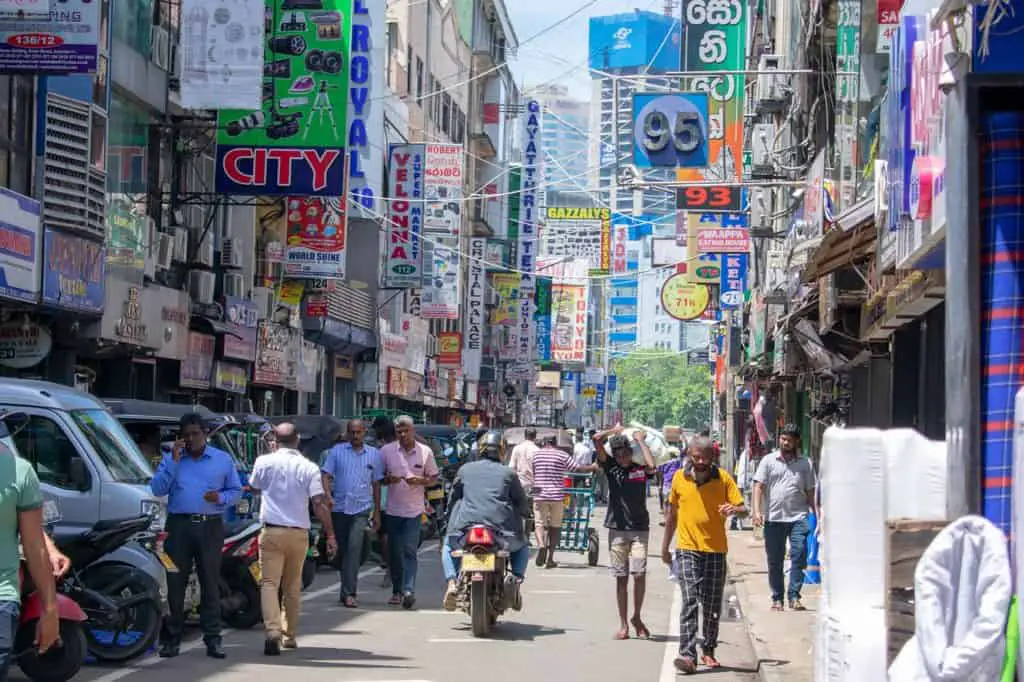
As all digital nomads know, there’s nothing more infuriating than arriving at your destination and realizing you can’t power any of your devices. To make sure that doesn’t happen to you, take a look at our tech guide for Sri Lanka.
Power Plugs and Sockets in Sri Lanka
Sri Lankan connections mainly operate at 230V 50Hz frequency, which is pretty much the stand for this part of the world.
So, you can use devices with voltages between 220 and 240 V, which are standard in most of Asia, Africa, and Europe.
However, if the standard voltage of your appliances ranges between 120-127V, which is the case for most of the US and Canada, you’ll need a voltage converter.
Pro-tip: Consider buying a combo power plug adapter/voltage converter to ensure you can use and charge all of your devices and/or appliances.
Freedom on the Internet
Sadly, Sri Lanka still has ways to go in order to ensure internet freedom for all. While not all speech is limited, a lot of it is monitored, and some people have even been punished for expressing themselves online.
All that being said, as long as you do your thing and stay out of politics, you have no reason to worry.
So, if you’re a travel blogger, YouTuber, Instagrammer and focus on that aspect, or just do your own thing, you’ll be able to work freely.
What to Do if Your Computer Is Broken
Sri Lanka has a solid number of computer repair shops, especially in bigger cities. Whether you’re struggling with finding the right plug and adapter, need someone to resurrect your laptop, or buy a new one, you’ll surely be able to find some help.
The downside is that larger chain shops only exist in bigger cities such as Colombo.
Cost of living in Sri Lanka
What Sri Lanka lacks in some areas, it more than makes up with the cheap cost of living. Moreover, the average estimated cost of living for a single person sits right around $1200.
To rent a two-bedroom apartment, you can expect to pay as little as $500 in smaller cities, and the utility costs are low as well.
However, rental prices may increase significantly, depending on the location and amenities.
The food and transportation are also quite cheap. The average meal at a local restaurant will cost you around $3, while the monthly bus fare costs around $15.
Travel basics for Sri Lanka
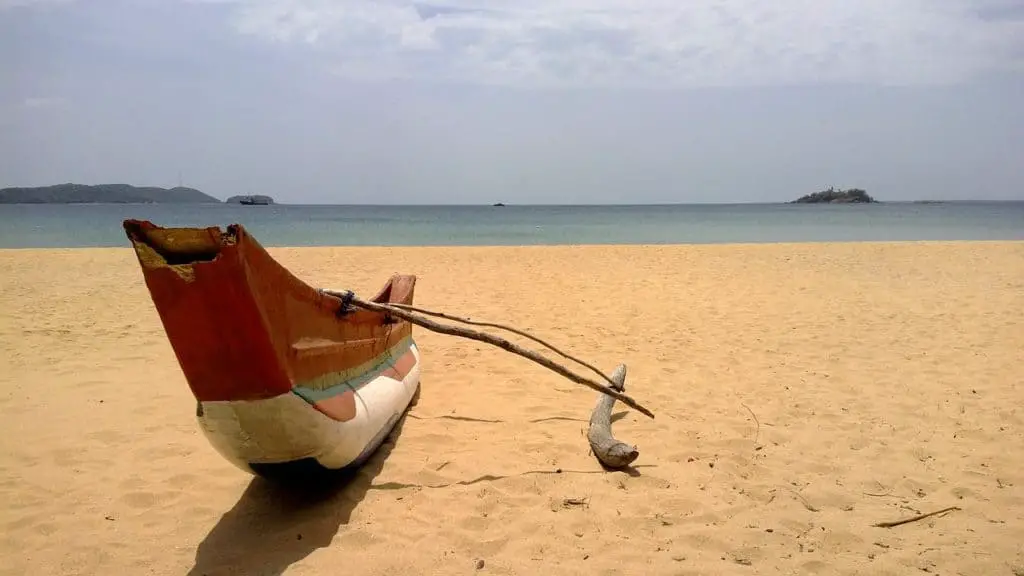
Language
Sri Lanka has two official languages, Tamil and Sinhala, but the people here also commonly use English. Sinhala is the most dominant language by far, with over 80% of the population using it.
However, an estimated 20-30% of the population are fluent in English, and its widely used for commercial as well as official purposes.
When to Visit Sri Lanka?
For such a small country, Sri Lanka has an incredibly complicated climate. However, this means that there’s always good weather on one side of the island — at any given point.
If you’re planning a trip to the south, west, or the hillside, you should plan your trip anywhere between December and March.
Within this time range, it’s best to visit Kandy, Unawatuna Bay, or Weligama.
On the other hand, if you’re thinking of heading up to the north or east coast, you should probably go there from April/May to September.
With the south part of the island being quite humid at this time frame, you can enjoy other places such as Jaffna or the Cultural Triangle.
Additionally, you could go to the Vesak Poya festival which is one of the best events in Sri Lanka.
Food
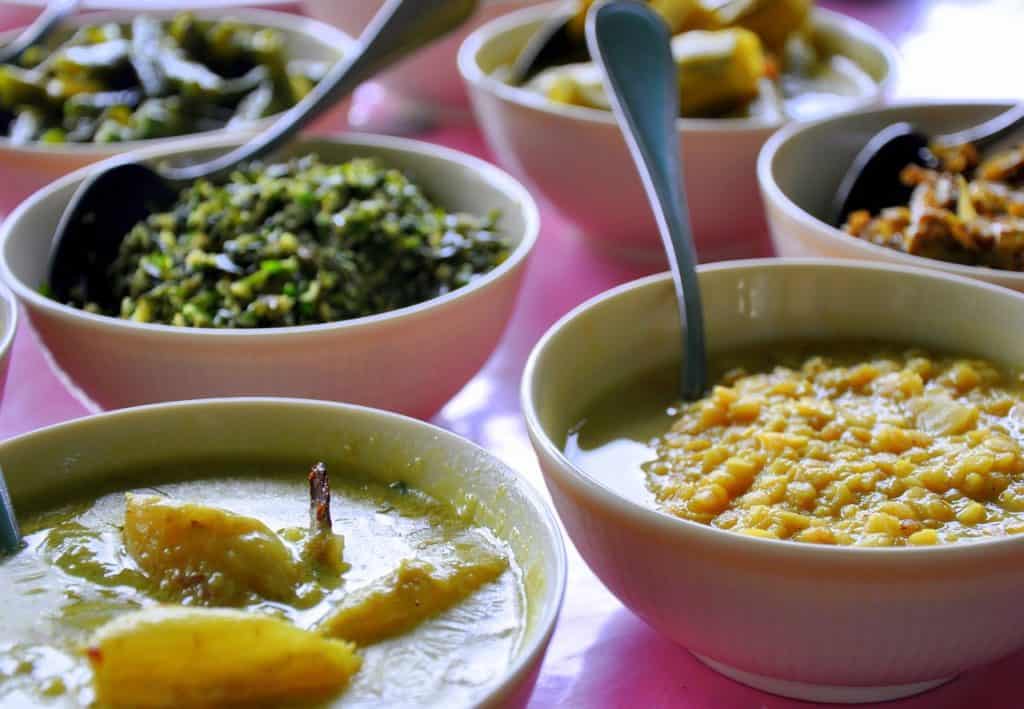
To better imagine Sri Lankan food, think of it as being kind of similar to Indian — but with a twist. It features a lot of sweet and sour combinations, as well as rice as a staple of every meal.
In a typical meal, you can expect to get rice, curry with a thin broth, as well as some high protein meat(fish, pork, beef, or goat).
Additionally, there are often a lot of side dishes, as well as snacks with every meal.
So, suffice it to say, Sri Lankan cuisine is perfect for both the venturesome and the not-so-adventurous visitors.
Where Digital Nomads Live in Sri Lanka
At this point, it’s probably safe to assume you’re hooked on the idea of living in Sri Lanka as a DN or are at least seriously considering it.
After all, what’s not to love? The 830-mile coastline, beautiful hotels and beach cafes, and mountain views that will take your breath away.
So, if you’ve got a piece of your heart invested in this idea, here are some places you can move to.
Colombo

In this article, we mentioned Colombo quite a bit — and for a good reason. The city has positioned itself as the ultimate getaway/DN paradise.
You can relax sitting in cafes on gorgeous beaches, all while enjoying great food and a steady WiFi connection. Also, as we briefly mentioned, Colombo has a lot of co-working spaces, which are relatively inexpensive and often come with some great perks.
We recommend checking out the Java Lounge- Jawatta, as it comes with great views, delicious food, as well as one of the best internet connections we’ve seen.
Marissa
Marissa is also loved by many digital nomads, and the quiet city offers a great work-life balance. There are plenty of hostels and cafes with a solid internet connection, as well as fun activities, perfect for all types.
If you’re more adventurous, you can go surfing on Weligama beach, hang out with the turtles on Polhena Beach, or visit the snake farm.
However, if you’re more low-key, you can visit the Sea Turtle Hatchery, or just sit back and relax at any beach lounge or cafe.
Kaduwela
Kaduwela Municipality is a Colorado suburb located around 10 miles from Colombo city center. It’s a very diverse urban area, that offers great fun in the sun, as well as fun nightlife.
So it’s perfect for digital nomads who want to have the best of both worlds, a quiet, mostly tourist-free life, as well as plenty of entertainment options.
Ella
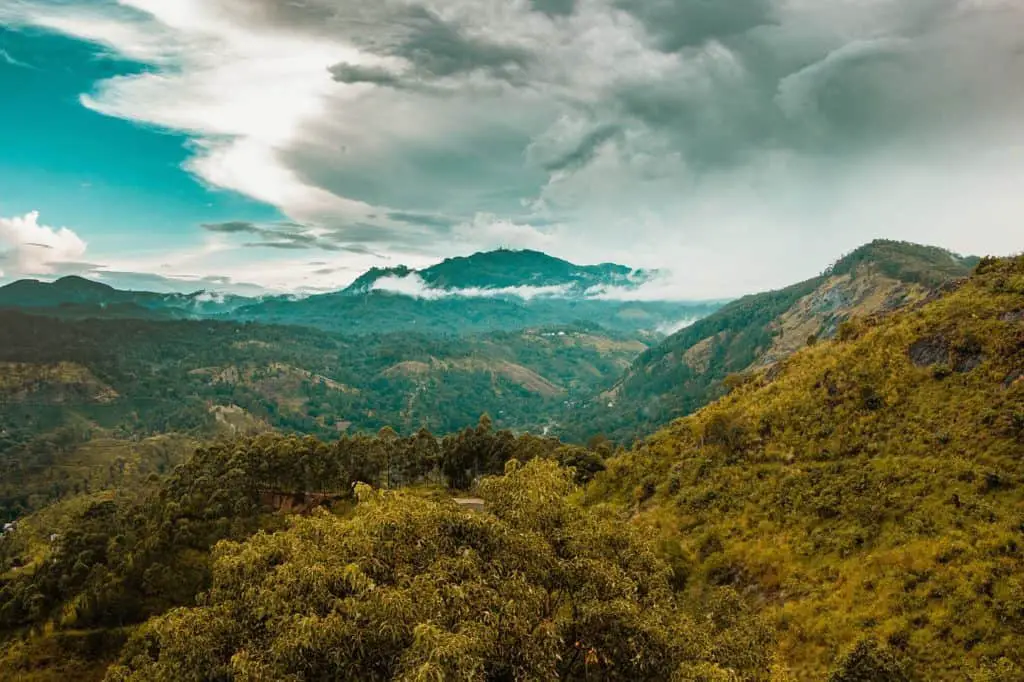
Ella is one of the most touristy places in Sri Lanka, which has its advantages and disadvantages.
This province is probably the most westernized in Sri Lanka, so you’ll be able to enjoy the food and amenities you’re familiar with.
However, during the peak season (typically June), Ella’s cafes, beaches, and restaurants can get quite busy, making it less than ideal for digital nomads.
That being said, you should plan to go to Ella between March and June, as this is the best time to visit it. Also, know that the Monsoon season lasts from July to November, so you may want to steer clear.
Accommodation for Digital Nomads in Sri Lanka
Sri Lanka is still not as popular with tourists as it should be, so most of the time accommodations are pretty easy to come by — and very inexpensive.
Whether you’re looking for an apartment in Ella with breathtaking views of the mountain or wanting to rent an entire villa, you’ll surely find an option that suits you with these tools.
Airbnb
There are thousands upon thousands of amazing Sri Lankan rentals on Airbnb. Ranging from inexpensive to luxurious, you can spend as little as $10 for rentals in Ella, or Weligama, and $20 in Colombo.
Believe it or not, you can even rent a whole 6-bedroom villa for $250 in Cassia Hill. So, Airbnb is a great place to search for your digital nomad home.
Booking.com
There are so many hotels in Sri Lanka, that renting a room in a lot of them has become affordable for most.
You can rent a room near the beach in Weligama for $10, and even a twin room in Colombo for less than $30.
Also, we love that the vast majority of these rentals offer free cancellation and no prepayment.
